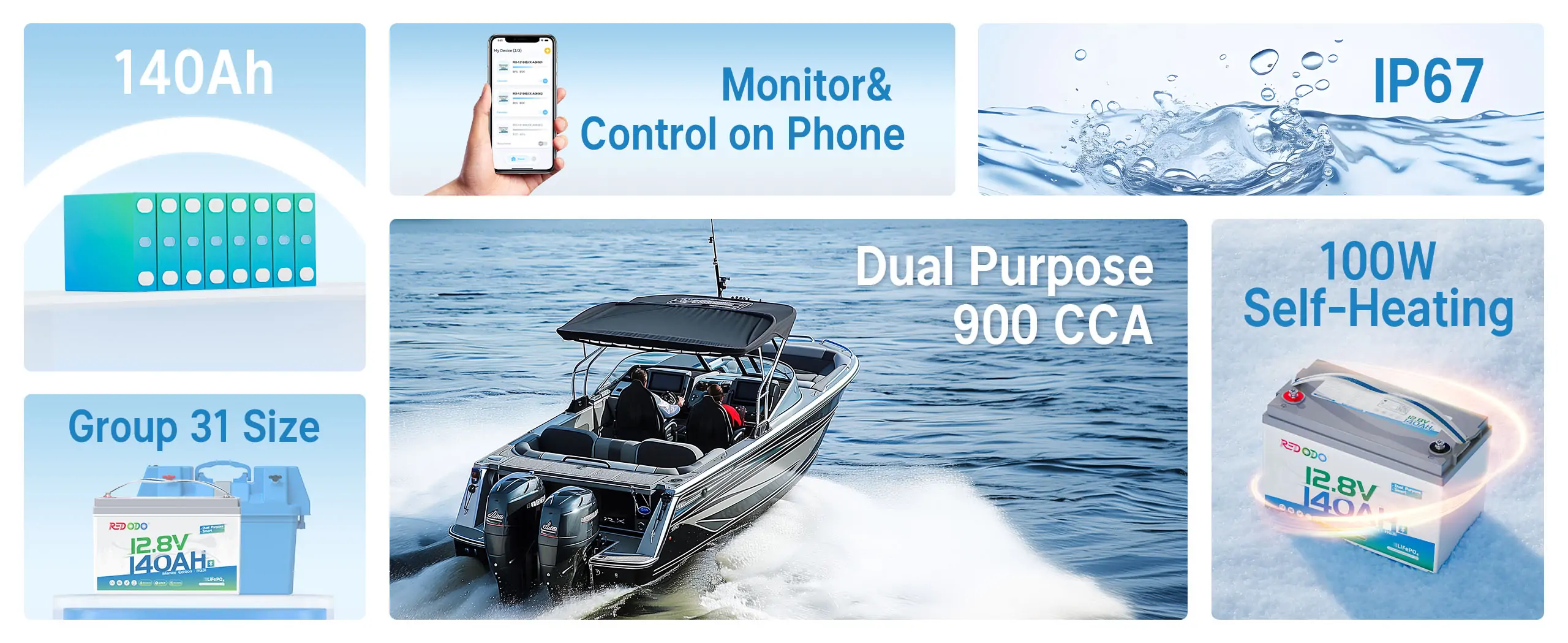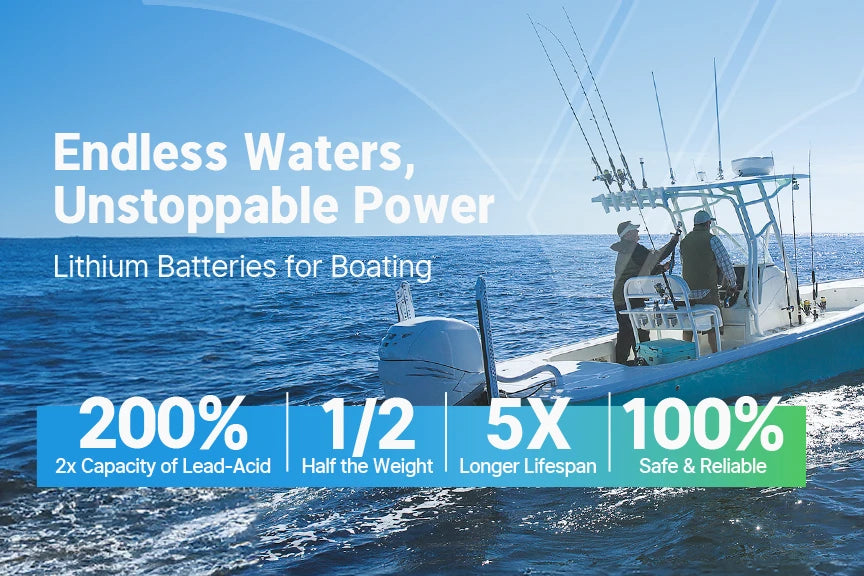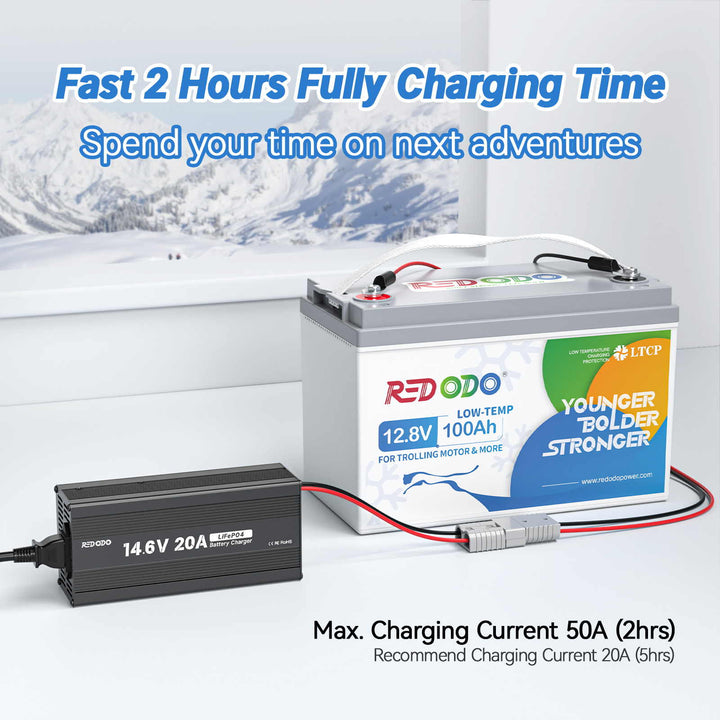For powering boat accessories, deep cycle batteries are your best choice for a boat. They’re designed for consistent, long-term use, providing reliable power to electronics, lights, and more. In this guide, you'll explore the different types of marine batteries, the best boat batteries setups, and key tips to avoid battery issues on the boat.
Table of Content
- 3 Types of Marine Batteries for Boat Accessories
- AGM VS. Lithium Battery, Which is Better for Your Boat?
- Why Do you Need 2 Batteries on a Boat?
- What Size Boat Battery Do I Need for My Trolling Motor?
- Tips for Avoiding Battery Problems on Boats
- Best Marine Deep Cycle Batteries for You
- FAQs about Marine Batteries
3 Types of Marine Batteries for Boat Accessories
When selecting a marine battery for your boat, it’s crucial to understand the three main types of marine batteries: marine starting battery, deep cycle batteries, and dual-purpose batteries.
Marine Starting Batteries
The marine cranking batteries are engineered to provide a quick burst of energy to start your boat’s engine. But they are not suitable for powering accessories over extended periods, as they can be quickly drained and damaged by deep discharges.
Marine Deep Cycle Batteries
Built for prolonged use, deep cycle batteries are ideal for powering accessories like lights, GPS, and fish finders. They discharge power steadily and can be recharged multiple times without losing capacity, making them the best choice for consistent accessory use.
Marine Dual-Purpose Batteries
Dual purpose batteries combine features of starting and deep cycle batteries, allowing them to start your engine and power accessories. However, dual purpose batteries typically can't handle deep discharges as effectively as deep cycle batteries.
Read More: Deep Cycle Batteries VS Starting Batteries
AGM VS. Lithium Battery, Which is Better for Your Boat?
Lithium boat batteries are generally the better choice due to their longer lifespan, lighter weight, and faster charging. However, AGM marine batteries remain a good option for budget-conscious boaters or those with simpler power needs. And here are their differences:
Cost
AGM batteries cost around $150 - $300 upfront, while lithium boat batteries typically range from $500 - $1,200. However, lithium batteries offer better long-term value, lasting 2-3 times longer than AGM batteries.
Weight and Size
AGM batteries weigh about 40-70 lbs and are bulkier. Lithium marine batteries, on the other hand, are around 30-50% lighter, making them ideal for saving space and reducing weight on your boat.
Lifespan
AGM batteries for boat typically last 3-5 years, while lithium marine batteries can last 10+ years and endure 3,000-5,000 charge cycles, compared to 500-1,000 for AGM.
Charging Speed
AGM batteries take 6-10 hours to fully charge, while lithium marine batteries can charge in 3-5 hours, allowing you to get back on the water faster.
Temperature Performance
Generally, AGM batteries can work at the temperature range of -20°C to 50°C (-4°F to 122°F), while lithium batteries have a wider range of -20°C to 60°C (-4°F to 140°F). At extreme temperatures, the lithium batteries perform better compared to AGM.
Explore Redodo lithium boat batteries for deep cycle, starting, and dual-purpose use.
Why Do you Need 2 Batteries on a Boat?
A dual-battery setup is the best marine setup. As distinct power needs of starting the engine and running onboard electronics, 2 batteries for boat are the minimum requirement. And here are the key benefits:
Power Demand Differences
Boat Starting Battery provides a quick, high-current burst for engine ignition. And boat deep cycle battery: Designed for steady, deep-cycle use to power lights, fish finders, and other electronics.
Prevents Boat Battery Power Draining
Marine starting batteries are typically smaller in capacity because they’re designed for short, high bursts of power. If the boat starting battery is used for both engine startup and electronics, it can quickly drain.
Using a deep cycle battery for starting would also be ineffective, as it’s built for sustained power, not quick bursts.
Enhanced Longevity and Reliability
By separating power demands, both batteries can operate efficiently and last longer.
What Size Boat Battery Do I Need for My Trolling Motor?
To determine the right boat battery size, focus on the voltage and amp hour (AH) rating.
Voltage (V):
Choose a marine battery based on your trolling motor's voltage requirement:
- 12V for small motors (30-70 lbs thrust).
- 24V for medium motors (70-100 lbs thrust).
- 36V for larger motors (100+ lbs thrust).
Amp Hour Rating (Ah):
The Ah rating shows how long a boat battery can power the motor. To estimate the needed capacity, multiply the motor’s amp draw by the desired runtime. For example, if the motor draws 10 amps and you want 5 hours of use, you’ll need a 50 Ah battery. But considering other factors, such as water speed, wind, etc., you may need a larger capacity battery like 100Ah battery.
Recommended Ah ratings are:
- 12V motors: 100-140 Ah
- 24V motors: 100-200 Ah
- 36V motors: 200-250 Ah or more
Related Reading: How Long Will a 100Ah Battery Run a 55lb Trolling Motor?
Tips for Avoiding Battery Problems on Boats
Marine batteries, whether deep cycle or starting batteries, require appropriate maintenance to avoid issues like reduced lifespan, charge loss, or physical damage. Here’s how to care for each type effectively, depending on whether you have lead-acid or lithium-iron phosphate batteries:
Don't Use a Deep Cycle Battery for Starting the Boat
Starting a boat engine requires a high burst of power, but deep cycle batteries for marine use are designed for steady, long-term power rather than short bursts. Therefore, deep cycle marine batteries are not suitable for starting an engine unless you're using a dual-purpose boat battery for starting and electronics.
Don't Power Accessories on a Boat with a Starting Battery
A starting battery can be used to power boat accessories like lights and electronics, but it's not ideal. Starting batteries are meant for short, high-current bursts required to start the engine. Using them for powering boat accessories can lead to faster discharge and reduced lifespan.
Proper Deep Cycle Batteries Charging Level
For lead-acid deep cycle batteries, keep the charge between 20-100% to avoid sulfation, which can shorten the battery's life by up to 50%.
For LiFePO4 deep cycle batteries, on the other hand, can handle deeper discharges, but it's still ideal to recharge them when they reach around 20% for optimal longevity.
Proper Starting Batteries Charging Levels
Lead-acid starting batteries need to stay fully charged to deliver peak performance and prevent failure.
LiFePO4 cranking batteries are lighter and more efficient, but it's still important to keep them charged above 50% to ensure consistent, reliable engine starts.
Clean Battery Terminals
For both deep cycle and starting batteries, corrosion on terminals can reduce power efficiency by up to 20%.
Regularly inspect the terminals and clean them using a wire brush or battery cleaner, especially for lead-acid batteries, which are more prone to corrosion.
Secure Batteries Properly
Whether using lead-acid or lithium iron phosphate batteries, both types must be securely fastened in their housings to prevent cracking or leaking from shifting or vibrations.
To cope with the harsh marine environment, you can consider using a portable battery box to protect your batteries from moisture, salt, and temperature fluctuations, enhancing their longevity and reliability in harsh marine conditions.
Store Batteries Correctly
Lead-acid batteries should be stored in a cool, dry place between 50°F and 77°F (10°C and 25°C) to prevent electrolyte evaporation.
Lithium iron phosphate (LiFePO4) batteries are more tolerant of temperature variations, with a safe storage range of -4°F to 140°F (-20°C to 60°C).
The most ideal temperature for them is between 50°F and 95°F (10°C and 35°C).
Learn More: How to Store LiFePO4 Batteries
Use a Trickle Charger
Trickle chargers are useful for maintaining charge in both lead-acid and lithium iron phosphate (LiFePO4) batteries during long storage periods. Especially for lead-acid batteries, using a trickle charger prevents sulfation.
Best Marine Deep Cycle Batteries for You
Choosing the right deep cycle battery is essential for powering your marine adventures. Here are some top-rated marine deep cycle batteries for your reference:
Redodo 12V 100Ah Deep Cycle Battery
This 12V 100Ah Deep Cycle Battery features durable construction and a built-in BMS for added safety as one of the best marine deep cycle batteries. It’s ideal for both freshwater and saltwater applications.
Advantages
- Handles high discharge rates for multiple devices
- Integrated BMS protects against overcharging and short circuits
- Environmentally friendly materials minimize impact
Redodo 12V 100Ah LiFePO4 Trolling Motor Battery
This specially upgraded 12V 100Ah Trolling Motor battery offers low-temperature charging protection and enhanced performance, making it perfect for trolling motors ranging from 30 to 70 lbs thrust. The lightweight design and increased capacity provide double the runtime compared to traditional AGM batteries.
Advantages
- Low-temp cutoff ensures safe operation in cold environments
- Lightweight design saves up to 40 pounds over traditional batteries
- High current capability supports up to 300A for better speed and maneuverability
Redodo 12V 100Ah Group 24 Bluetooth LiFePO4 Battery
This 12V 100Ah Group 24 Battery with Bluetooth is ideal for marine applications, offering a lightweight and compact design that’s perfect for boats. With advanced Bluetooth monitoring, you can easily track battery performance and status in real-time, ensuring reliable power for trolling motors and onboard electronics.
Advantages
- Smart Bluetooth app provides real-time monitoring and remote control
- Lightweight at only 21.8 lbs, 65% lighter than AGM batteries
- Built with top EV-grade cells for over 4000 cycles at 100% DOD
Redodo 12V 140Ah Dual Purpose Marine Battery
This 12V 140Ah Dual Purpose Marine Battery is designed for both starting outboard motors and powering 12V trolling motors and electronics. Its robust BMS and automatic heating function ensure reliable performance in marine environments, even in cold conditions.
Advantages
- Dual-purpose design supports both cranking and deep cycle needs
- High cranking power with 900CCA and 1200MCA for outboards up to 225hp
- Automatic heating function for optimal performance in cold weather

Conclusion
In summary, selecting the right battery for your boat's accessories—whether a deep cycle or a starting battery—ensures reliable performance and enhances your time on the water. To keep your setup efficient and worry-free, consider investing in high-quality options. For the best in marine cranking and deep cycle batteries, visit Redodo’s website to explore our top-rated products and find the perfect fit for your boating needs.
FAQs about Marine Batteries
What kind of marine battery should I use to start my boat?
For starting your boat, a marine cranking battery is ideal. These batteries are specifically designed to provide a high amount of current for a short duration, perfect for starting the engine.
If you want enhanced performance, consider lithium iron phosphate (LiFePO4) batteries, which not only recharge faster but also have a longer lifespan and better energy efficiency compared to traditional lead-acid batteries.
Is an AGM battery good to use in marine applications?
Yes, absorbed glass mat (AGM) batteries are a great option for marine use. They are maintenance-free, meaning you don’t have to check water levels, and they are resistant to vibrations, making them suitable for rough marine environments.
AGM batteries can be mounted in any position, which provides flexibility in installation. Their ability to handle both starting and deep cycle applications makes them versatile for various boating needs.
LiFePO4 batteries are also an excellent choice for marine use. They are much lighter than AGM batteries for the same capacity, making them more suitable for smaller boats where weight is a concern.
Is there a difference between a deep-cycle and a marine battery?
Yes, there is a distinction. A deep-cycle battery is specifically designed for sustained energy output over extended periods, making it ideal for powering accessories like lights, electronics, and trolling motors.
In contrast, a marine battery is a broader category that includes various types of batteries designed for use in boats, including starting batteries (which provide quick bursts of power) and deep-cycle batteries.
All in all, all deep-cycle batteries can be marine batteries, but not all marine batteries are deep-cycle batteries.
Read More:
Group 24 VS Group 31 Deep Cycle Batteries
Marine Battery Group Size Chart

Redodo

Redodo
Recent Post

How Long Does a Trolling Motor Battery Last?

Convert RV from Lead-Acid to Lithium Battery: A Complete Guide

How Long Will a 200Ah Battery Run an Air Conditioner?

A Full Review of Redodo 12V 140Ah Group 31 Deep Cycle Battery






![⚡[$248 after Sign-Up] Redodo 12V 100Ah Plus Bluetooth Marine Battery | For Marine, Trolling Motors, RV](http://www.redodopower.com/cdn/shop/files/Redodo12V100AhOBMOutboardMotorLithiumMarineBattery.webp?v=1743584091)
![⚡[$266 after Sign-Up] Redodo 24V 50Ah Bluetooth Trolling Motor Battery | For 24V Trolling Motors with up to 100 lbs](http://www.redodopower.com/cdn/shop/files/Redodo24V50AhTrollingMotorBatterywithBluetooth02.webp?v=1741251660)

![⚡[$294 after Sign-Up] Redodo 12V 140Ah Group 31 Lithium Battery with Bluetooth | 40% More Capacity | For RV, Marine, Solar Home](http://www.redodopower.com/cdn/shop/files/Redodo_12V_140ah_bluetooth_battery_ee6d5fd1-5c7d-4b9a-90ab-d54d06b29a04.jpg?v=1742967763)
![⚡[$220 after Sign-Up] Redodo 12V 100Ah Lithium Trolling Motor Battery With Low Temp Protection](http://www.redodopower.com/cdn/shop/files/Redodo12V100Ahlow-tempbattery.webp?v=1738462317)
![⚡[$239 after Sign-Up] Redodo 12V 100Ah Group 24 Bluetooth LiFePO4 Battery | Real-Time Battery Monitoring | For RV, Marine, Solar](http://www.redodopower.com/cdn/shop/files/Redodo_12V_100Ah_group_24_bluetooth_lithium_battery.jpg?v=1744253032)
![⚡[$220 after Sign-Up] Redodo 12V 100Ah Group 31 Bluetooth Lithium Battery | Real-Time Battery Monitoring | For RV, Marine, Solar](http://www.redodopower.com/cdn/shop/files/redodo_12v_100ah_bluetooth.webp?v=1744698930)